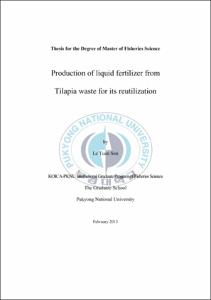Production of liquid fertilizer from Tilapia waste for its reutilization
- Abstract
- The growth of Tilapia production and consumption, along with inefficient and untreated fish waste, is lead to increase the amount of fisheries waste in Vietnam, which urges us to seek for efficient treatment to remove organic load from processing plants. To re-utilize Tilapia waste as a fertilizer, eleven bacteria and fish waste were performed for around 72 h in a 1L seven-neck flask during bioconversion process. By the active biodegradation, removal percentages of CODCr of solid and liquid waste were 72.7 and 61.7%, respectively. The degradation rates of solid and liquid waste were 0.15 and 0.05 g/h. The cell density climbed significantly after 36 h up to 8.7x106 CFU/ml for solid waste and after 24 h up to 3.3x106 CFU/ml for liquid waste. The germination index of cress seeds (Lepidium sativum) of 500 and 1000 folds of solid and liquid waste broth were 70.0 and 82.4%, 60.7 and 73.9%, respectively. The fastest growth of barley for hydroponic culture was achieved at 500-fold dilution broth using solid or liquid waste.
- Issued Date
- 2013
- Awarded Date
- 2013. 2
- Type
- Dissertation
- Publisher
- 부경대학교
- Affiliation
- 부경대학교 대학원
- Department
- 대학원 국제수산과학협동과정
- Advisor
- 김중균
- Table Of Contents
- Introduction 1
Materials and Methods 9
1. Tilapia waste 9
2. Microorganisms 9
3. Biodegradation of fish waste 11
4. Analytic methods 13
5. Seed germination test 13
6. Hydroponic culture 14
Results 16
1. Biodegradation of Tilapia waste 16
2. Germination test 21
3. Fertilizing value of the biodegraded fish waste 26
Discussion 30
Conclusion 34
Acknowledgement 35
References 37
- Degree
- Master
- Appears in Collections:
- 글로벌수산대학원 > 국제수산과학협동과정
- Files in This Item:
-
-
Download
 Production of liquid fertilizer from Tilapia waste for its reutilization.pdf
기타 데이터 / 1.11 MB / Adobe PDF
Production of liquid fertilizer from Tilapia waste for its reutilization.pdf
기타 데이터 / 1.11 MB / Adobe PDF
-
Items in Repository are protected by copyright, with all rights reserved, unless otherwise indicated.